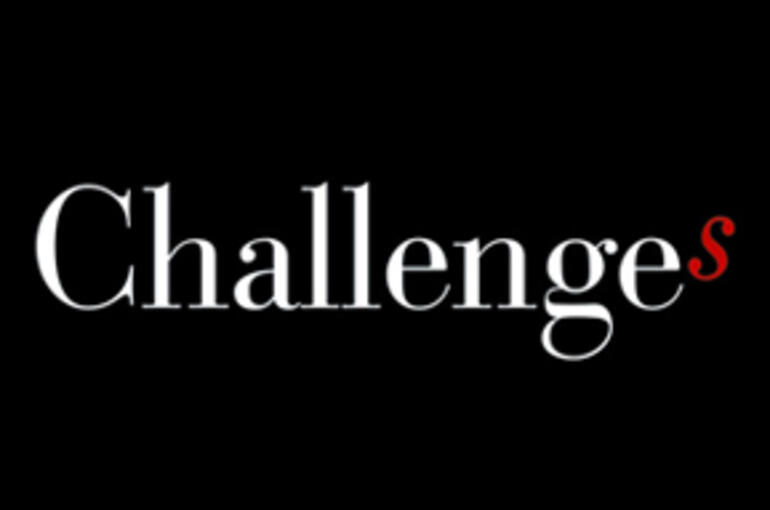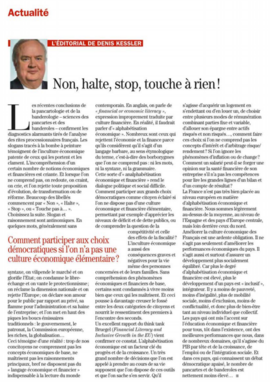STOP, DON’T CHANGE ANYTHING!
Chairman & CEO of SCOR, Denis Kessler publishes an editorial piece in the French weekly Challenges, covering economic, political and financial current events in France and worldwide.
May 25, 2018

That peculiar French rite of Spring – the never-ending procession of placards and banners – confirms an alarming diagnosis. Spray-painted slogans betray the obvious economic illiteracy of those who hold them and chant them. The lack of understanding of a certain number of economic and financial concepts is blatant. And when people do not understand, they fear, they dread, they scream, and they reject any proposal for change, transformation or reform. Often their signs start with “NO”, “STOP”, “NO MORE”, “DON’T CHANGE …”. Take your pick, the slogan will be diametrically opposed to reason. In a few words, generally devoid of syntax, these slogans vilify the market and glorify the State. They condemn free trade and praise protectionism. They clamor for domestic priorities and reject Europe. They declare affection for the public and aversion to the private, love of State agencies and loathing of corporations. And the usual scapegoats are pilloried: the government, corporate executives, the European Commission, the rich, globalization, etc.
The reality is that too many of our fellow citizens do not understand basic economic concepts or the principal lines of reasoning that accompany them. In short, they do not possess the “economic and financial literacy” necessary to understand today’s world. Many people reject economics and finance, because they consider it to be a barbaric language in the etymological sense of the term, i.e. strange sounds that they don’t understand, in which they discern neither the words nor the syntax nor the grammar.
Obviously, this “economic and financial illiteracy” strains political and social dialogue. How can we take part in a country’s major democratic choices as knowledgeable citizens if we don’t possess the elementary economic and financial concepts that would enable us to appreciate, for example, the size of the deficit or the level of public debt, or to understand competitiveness and the effects of taxation?
Economic illiteracy also has serious and negative consequences for the personal lives of the people concerned and for their families. Those with economic and financial knowledge can make informed choices in many aspects of their lives. Those who do not understand basic economic and financial phenomena are condemned to live less well than those who do. This widens the gap between the two categories of citizens and aggravates the resentment the former feel against the latter.
An excellent report recently published by the think tank Bruegel (Financial literacy and inclusive growth in the EU), confirms this observation. Economic literacy is a key factor in progress and growth. A great many decisions we must make over the course of our lives require these tools and the know-how to use them. Should we buy a home by going into debt or should we rent one instead? Which compensation package, including fixed and variable portions, should we choose? How should we allocate our savings between risky and risk-free assets? We cannot make these decisions if we do not understand the concept of interest or the trade-off between risk and return. Or if we know nothing about inflation or exchange rates. How can employees form an opinion about the financial condition of their employer if they don’t understand the mechanisms of investment and productivity, or if they can’t perform a basic analysis of a balance sheet and an income statement?
France is not very well positioned within Europe in terms of economic and financial literacy. We are slightly above the average, at the level of Spain and the countries of central Europe, but way behind the northern European countries.
Improving the economic knowledge of the French population is a burning necessity. The goal is not only to improve the country’s economic performance, it’s also and above all about ensuring more balanced social development. The more economic and financial literacy there is in a country, the more inclusive that country’s development will be. There will be less poverty, less inequality, more social mobility, less exclusion, less conflict and therefore more wellbeing at both the individual and the collective level. The countries that have made economic and financial education for all a priority, from an early age, perform better than we do in many areas, be it GDP per capita, growth, employment or social integration. And in those countries, where democratic debate is more peaceful, the number of placards and banners is much lower.
